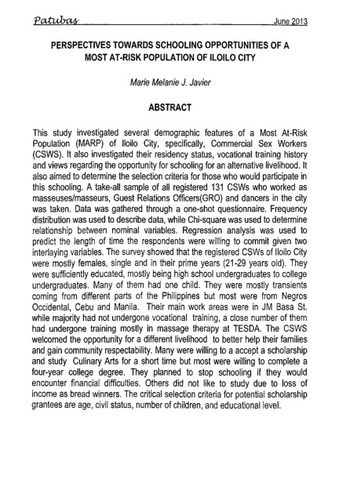Perspectives towards schooling opportunities of a most at-risk population of Iloilo City
| dc.contributor.author | Javier, Marie Melanie J. | |
| dc.coverage.spatial | Iloilo | en_US |
| dc.date.accessioned | 2021-03-23T02:02:49Z | |
| dc.date.available | 2021-03-23T02:02:49Z | |
| dc.date.issued | 2013-06 | |
| dc.identifier.citation | Javier, M. M. J. (2013). Perspectives towards schooling opportunities of a most at-risk population of Iloilo City. Patubas, 8(1), 56-73. | en_US |
| dc.identifier.issn | 1908-515X | |
| dc.identifier.uri | https://hdl.handle.net/20.500.12852/648 | |
| dc.description | Journal article | en_US |
| dc.description.abstract | This study investigated several demographic features of a Most At-Risk Population (MARP) of Iloilo City, specifically, Commercial Sex Workers (CSWS). It also investigated their residency status, vocational training history and views regarding the opportunity for schooling for an alternative livelihood. It also aimed to determine the selection criteria for those who would participate in this schooling. A take-all sample of all registered 131 CSWs who worked as masseuses/masseurs, Guest Relations Officers(GRO) and dancers in the city was taken. Data was gathered through a one-shot questionnaire. Frequency distribution was used to describe data, while Chi-square was used to determine relationship between nominal variables. Regression analysis was used to predict the length of time the respondents were willing to commit given two interlaying variables. The survey showed that the registered CSWs of Iloilo City were mostly females, single and in their prime years (21-29 years old). They were sufficiently educated, mostly being high school undergraduates to college undergraduates. Many of them had one child. They were mostly transients coming from different parts of the Philippines but most were from Negros Occidental, Cebu and Manila. Their main work areas were in JM Basa St. while majority had not undergone vocational training, a close number of them had undergone training mostly in massage therapy at TESDA. The CSWS welcomed the opportunity for a different livelihood to better help their families and gain community respectability. Many were willing to a accept a scholarship and study Culinary Arts for a short time but most were willing to complete a four-year college degree. They planned to stop schooling if they would encounter financial difficulties. Others did not like to study due to loss of income as bread winners. The critical selection criteria for potential scholarship grantees are age, civil status, number of children, and educational level. | en_US |
| dc.language.iso | en | en_US |
| dc.publisher | Central Philippine University | en_US |
| dc.subject.lcsh | Sex workers | en_US |
| dc.subject.lcsh | Prostitution | en_US |
| dc.subject.lcsh | Masseurs | en_US |
| dc.subject.lcsh | Vocational guidance | en_US |
| dc.subject.lcsh | Vocational education | en_US |
| dc.subject.lcsh | Philippines--Iloilo | en_US |
| dc.title | Perspectives towards schooling opportunities of a most at-risk population of Iloilo City | en_US |
| dc.type | Article | en_US |
| dc.citation.firstpage | 56 | en_US |
| dc.citation.lastpage | 73 | en_US |
| dc.citation.journaltitle | Patubas | en_US |
| dc.citation.volume | 8 | en_US |
| dc.citation.issue | 1 | en_US |
| local.relation.associatedcontent | https://repository.cpu.edu.ph/handle/20.500.12852/914 Research report | en |
Fichier(s) constituant ce document
Ce document figure dans la(les) collection(s) suivante(s)
-
Journal articles [36]
-
Patubas [110]
Patubas is a refereed research journal of Central Philippine University.


